Google is famous for its graveyard of abandoned projects, but Search Generative Experience (SGE) hasn’t joined that list. Instead, it launched May 14, 2024 as AI Overviews and began its predicted negative impact on organic:
- Visibility
- Traffic
- Conversions
- Revenue
Learn more about how SGE affects SEO and how to respond now!
A look back: How will SGE affect SEO?
When it launched in Google Labs, SEOs invested hundreds of hours researching how SGE would affect SEO. They found it would decrease organic visibility, which would lower organic traffic, conversions, and revenue, with some sites estimating a 20 to 60% decrease in organic traffic.
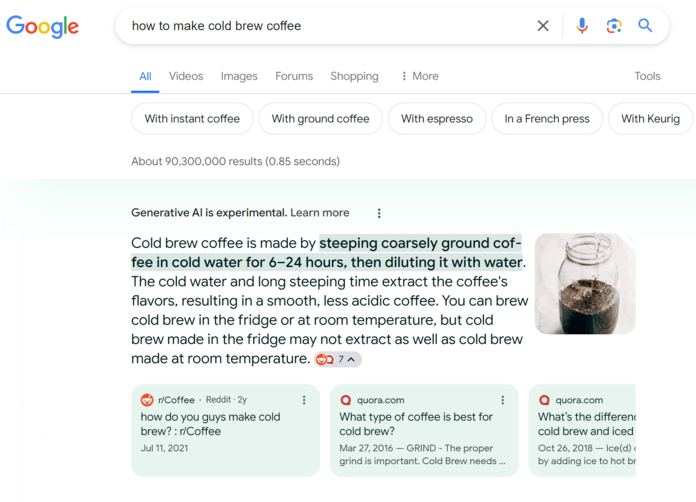

Grow Your Visibility Beyond Google
Capture leads and traffic from emerging search platforms like ChatGPT, Perplexity, and Google AI.

Why do AI Overviews affect search engine optimization?
AI Overviews affect search engine optimization for a few reasons:
- Function: Google designed AI Overviews to answer a user’s search intent while providing the means (and encouragement) for users to continue their journey from within the SGE. This design aligns with Google’s evolution from a search engine to an answer engine. It’s important to note, though, that this feature is no longer available with AI Overviews (but could return).
- Placement: With AI Overviews, the AI-powered snapshot appears at the top of search results —before organic search results and sometimes before paid listings. This placement gives AI Overviews maximum visibility while downgrading the top organic search results.
- Monetization: Growth is Google’s — and its shareholders’ — goal. Paid ads serve as the company’s biggest revenue source, and with AI Overviews, the company has a new avenue for generating revenue: AI Overview ads. As Google explores new advertising avenues, it’s also worth considering the potential for advertising on other AI platforms like ChatGPT advertising.
- Appearance: AI Overviews appear across searches, from informational to transactional. On average, these snapshots have a height of 1764 pixels, which moves organic listings down more than 140%.
Search engine optimization success depends on visibility. Even for sites ranking #1, AI Overviews decrease organic visibility so significantly that it often requires scrolling halfway down the search results to view the first organic listing.
How much will AI Overviews affect SEO?
How much AI Overviews affect SEO long-term depends on a few factors:
- Snapshot: Multiple AI-powered snapshots exist, from product listings to text-based summaries. The usefulness of those snapshots will shape whether users engage with AI Overviews or move to the organic search results.
- Industry: Publishers expect the biggest impact from AI Overviews, with some publishers expecting a 20 to 60% decrease in organic search traffic. Sectors in the “Your Money, Your Life” (YMYL) sphere, like finance, insurance, and health, could see less of an impact from AI-powered snapshots.
- Target audience: Since SGE’s launch in Google Labs, Google has shared that younger demographics (18-24 year olds) have responded well to SGE results, which could indicate higher adoption rates among younger vs. older users.
- User adoption: AI Overviews’ success (and impact) depends on user adoption, which requires Google to overcome AI challenges like hallucinations and how people decide to use these AI-powered snapshots.
Remember that Google is still testing and evolving AI Overviews.
Who will AI Overviews affect the most?
AI Overviews will affect all websites. In its current version, search engine optimization experts have concerns for the following industries:
- Ecommerce, especially for transactional searches
- Publishers, especially affiliate sites targeting “best” or “top” terms
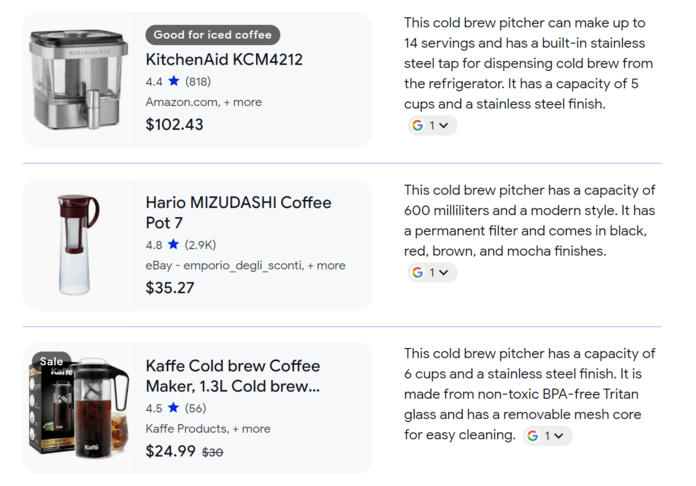
However, a pre-launch study shows SGE would affect more than those two, but also:
- Healthcare, where 76% of queries triggered SGE
- Technology, where 49% of queries triggered SGE
- Insurance, where 45% of queries triggered SGE
- Education, where 44% of queries triggered SGE
The point is that AI Overviews affect your business, which demands your team’s response.
How to evaluate your traffic risk
Evaluating how AI Overviews will affect your SEO efforts requires research within Google Search Console, Google Analytics 4, and AI Overviews. A few SEOs (listed below) have created templates for completing an SEO impact analysis:
If you’re curious about preparing for AI Overviews’ SEO impact, you’ll find our recommendations below!
How to respond to AI Overviews
Prepare for AI Overviews’ SEO impact with these actionable steps:
1. Manage leadership’s expectations
First, reset leadership’s expectations for SEO’s performance.
Google’s AI Overviews will affect organic traffic — how much depends on your site’s risk levels, SEO optimizations, and user behavior. You must ensure leadership understands that traffic will likely decline and affect other critical metrics, like organic revenue.
Consider setting new performance benchmarks to help here. You should also outline how the team is responding to this shift (see the tips below for how to respond to AI Overviews’ search engine optimization impact).
2. Improve E-E-A-T
AI Overviews are “rooted” in Google’s “core Search ranking and quality systems,” which include the Helpful content system. If you’re familiar with the Helpful content system, it ties into E-E-A-T. So, what is E-E-A-T? It emphasizes the importance of:
- Expertise
- Experience
- Authority
- Trust
A recent study into generative search engines (like AI Overviews) confirmed the impact of E-E-A-T:
- Authoritative adjustments to content improved rankings 89% in one example
- Trust adjustments to content improved rankings 134% in one example
Bring more E-E-A-T to your content by:
- Infusing content with cited sources
- Including statistics from reputable sources
- Using authoritative language
For example, if writing a restaurant review, include your opinion, plus data-backed information, like the number of reviews for the restaurant and the average user rating about the past six months. This data can build your content’s authority and user trust.
3. Make content easy to read
Researchers also found in their generative search engine experiments that easier-to-read content ranked better in generative search engines. Improving readability is a quick win, and a tool like WebFX’s Readability Test Tool can help you get started.
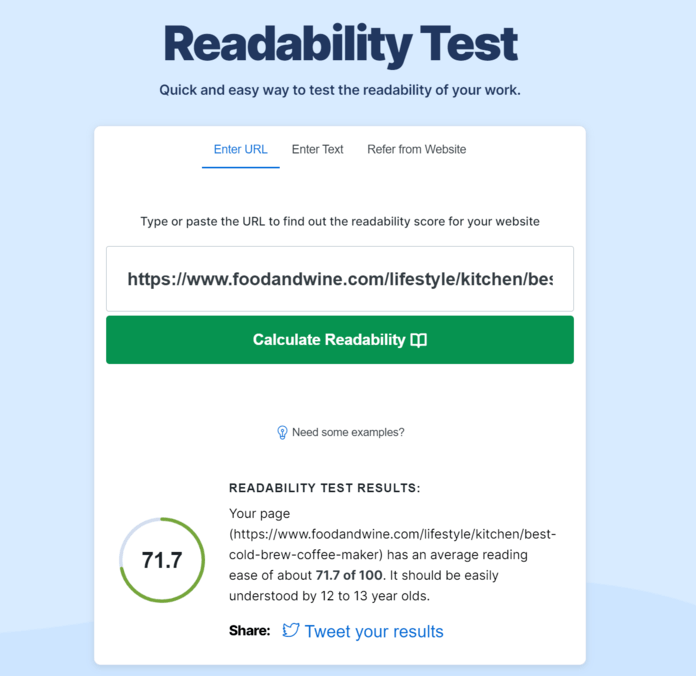
4. Embrace structured data
Structured data is critical to AI Overviews. That’s because schema markup provides the large language models (LLMs) powering AI-powered snapshots with more context about your content and business.
According to Google, SGE “is built on Google’s Shopping Graph,” which gets its data from Google Merchant Center and indexed URLs. Indexed URLs with Product markup can provide Google with valuable information for its Google Shopping Graph.
Get started with structured data with markup options like:
- Product markup
- LocalBusiness markup
- Organization markup
Check out our schema markup guide for how to generate and add structured data.
5. Enhance content with multimedia
Google uses multi-modal models in AI Overviews. A multi-modal model understands more than text — it can also understand images, videos, and voice. Give these models more to work with by creating custom images, videos, and audio that can appear in AI-powered results.
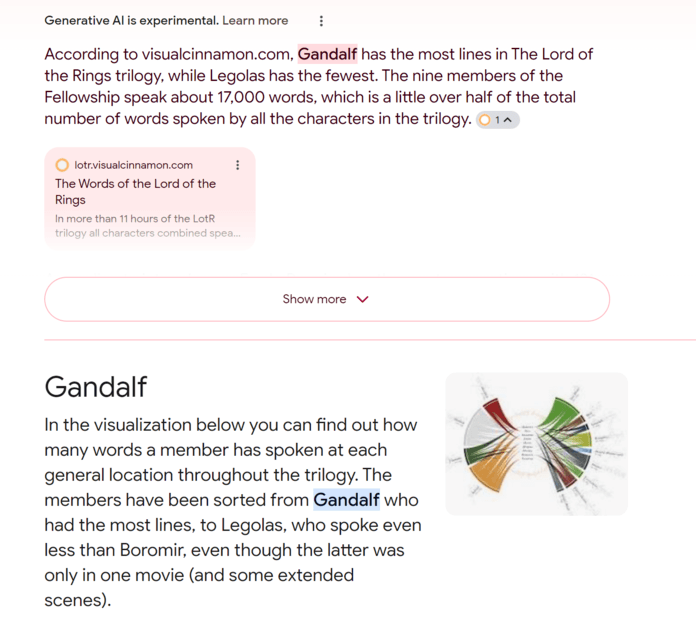
Images that appear in organic search results (below AI-powered snapshots) can also compel users to visit your site. Your multimedia can also appear in Google Image or Google Video search, which doesn’t have the Search Generative Experience.
6. Acquire third-party mentions
Third-party mentions provide another chance to appear in SGE-generated results. That’s because Google can use these sites to generate AI Overviews (“what are the best XYZ apps?”), which could feature your brand’s name and trigger users to search for your brand.
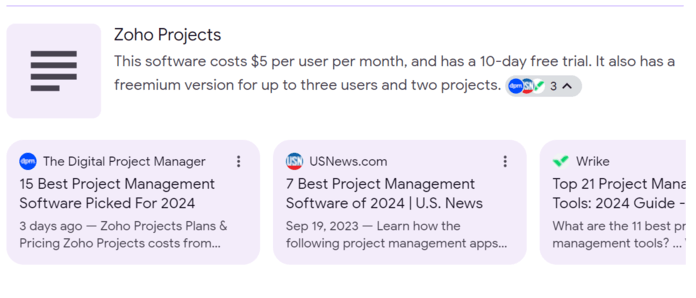
Getting these mentions is similar to acquiring backlinks. With outreach, plus a compelling brand and offer, it’s possible to get third-party publishers to review or feature your brand. In some cases — like a directory site — you’ll need to pay for a listing.
7. Supercharge search intent
AI Overviews aim to provide users with everything they need to understand a topic, like a supercharged featured snippet. That’s why SEOs recommend supercharging SEO content by targeting:
- Suggested follow-up questions in SGE
- People Also Ask
- Common questions on forum threads
While these are effective strategies, it’s important to consider your target audience. Focus on reaching that audience by asking the questions they’re most likely to ask, which you can find by reading online reviews and speaking to departments like sales and customer support.
Offset AI Overviews impact on SEO
Yes, AI Overviews impact SEO, but there are steps SEOs can take now to offset its impact. Get started with the above resources and tips, or receive professional assistance with our AI Overview optimization services — powered by the award-winning team behind SEO.com, WebFX.

Keep Up With The Changing Landscape of SEO
Join our newsletter to receive practical tips and expert advice to help you improve your website’s visibility.



Future-Proof Your SEO Strategy with OmniSEO™
Goodbye search engine optimization, hello search everywhere optimization.

Future-Proof Your SEO Strategy with OmniSEO™
Goodbye search engine optimization, hello search everywhere optimization.



